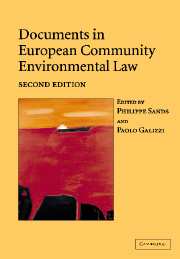Book contents
- Frontmatter
- Contents
- Preface
- PART I General principles of EC environmental law
- PART II European Community institutions and legislation
- PART III The relationship between environmental protection, financial assistance and free trade
- 9 75/436/Euratom, ECSC, EEC: Council Recommendation of 3 March 1975 regarding cost allocation and action by public authorities on environmental matters (OJ L 194 25.07.1975 p. 1)
- 10 Council Regulation (EC) No 1164/94 of 16 May 1994 establishing a Cohesion Fund (OJ L 130 25.05.1994 p. 1)
- 11 Regulation (EC) No 1655/2000 of the European Parliament and of the Council of 17 July 2000 concerning the Financial Instrument for the Environment (LIFE) (OJ L 192 28.07.2000 p. 1)
- 11A Regulation (EC) No 1682/2004 of the European Parliament and of the Council of 15 September 2004 amending Regulation (EC) No 1655/2000 concerning the Financial Instrument for the Environment (LIFE) (OJ L 308 05.10.2004 p. 1)
- 12 Community guidelines on State aid for environmental protection (OJ C 037 03.02.2001 p. 3)
- PART IV Procedural techniques of environmental protection
- PART V Protection of air quality
- PART VI Biodiversity and nature conservation
- PART VII Waste
- PART VIII Dangerous substances
- PART IX Water quality
9 - 75/436/Euratom, ECSC, EEC: Council Recommendation of 3 March 1975 regarding cost allocation and action by public authorities on environmental matters (OJ L 194 25.07.1975 p. 1)
from PART III - The relationship between environmental protection, financial assistance and free trade
Published online by Cambridge University Press: 06 January 2010
- Frontmatter
- Contents
- Preface
- PART I General principles of EC environmental law
- PART II European Community institutions and legislation
- PART III The relationship between environmental protection, financial assistance and free trade
- 9 75/436/Euratom, ECSC, EEC: Council Recommendation of 3 March 1975 regarding cost allocation and action by public authorities on environmental matters (OJ L 194 25.07.1975 p. 1)
- 10 Council Regulation (EC) No 1164/94 of 16 May 1994 establishing a Cohesion Fund (OJ L 130 25.05.1994 p. 1)
- 11 Regulation (EC) No 1655/2000 of the European Parliament and of the Council of 17 July 2000 concerning the Financial Instrument for the Environment (LIFE) (OJ L 192 28.07.2000 p. 1)
- 11A Regulation (EC) No 1682/2004 of the European Parliament and of the Council of 15 September 2004 amending Regulation (EC) No 1655/2000 concerning the Financial Instrument for the Environment (LIFE) (OJ L 308 05.10.2004 p. 1)
- 12 Community guidelines on State aid for environmental protection (OJ C 037 03.02.2001 p. 3)
- PART IV Procedural techniques of environmental protection
- PART V Protection of air quality
- PART VI Biodiversity and nature conservation
- PART VII Waste
- PART VIII Dangerous substances
- PART IX Water quality
Summary
Editorial note
Council Recommendation 75/436 Euratom, ECSC, EEC of 3 March 1975 regarding cost allocation and action by public authorities on environmental matters seeks to apply the ‘polluter pays’ principle at both the Community and the Member State level. The operative elements are in the Annex. The principle, intended to induce reductions in pollution levels and a more rational use of environmental resources, is considered to be effective and equitable; if applied uniformly throughout the Community, it should avoid trade and investment distortions (paragraph 1). The polluter pays principle is defined as requiring the party responsible for pollution to meet the cost of measures to eliminate or reduce pollution according to quality objectives or standards set by public authorities – in other words, environmental protection should not be dependent on state aid (paragraph 2). The ‘polluter’ is the person who damages the environment directly or indirectly or creates the conditions for damage to occur; where it proves too difficult to identify the polluter, the costs are to be borne by the person whose penalisation will yield the optimal result from an economic, administrative and environmental point of view (paragraph 3).
Two economic instruments are identified as capable of implementing the polluter pays principle: standards and charges (paragraph 4). The Recommendation specifies which particular expenditures the polluter must bear in order to comply with the polluter pays principle and outlines two permissible exceptions (paragraphs 5 and 6).
- Type
- Chapter
- Information
- Documents in European Community Environmental Law , pp. 195 - 201Publisher: Cambridge University PressPrint publication year: 2006
- 1
- Cited by



